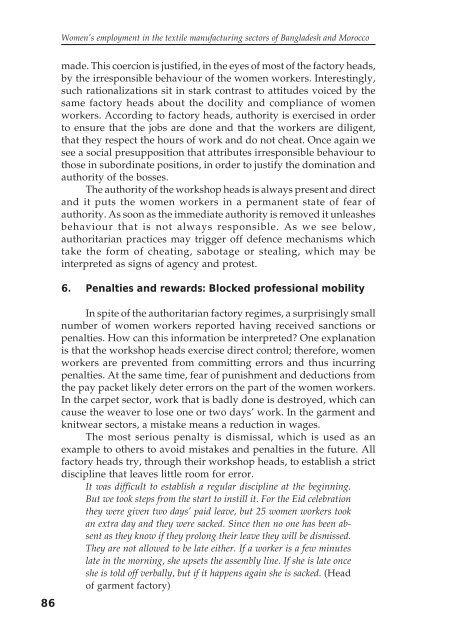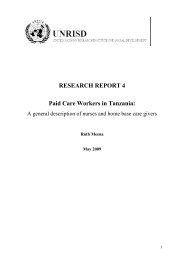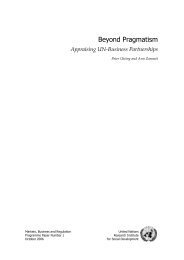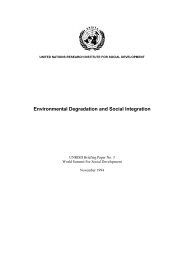Women's Employment - United Nations Research Institute for Social ...
Women's Employment - United Nations Research Institute for Social ...
Women's Employment - United Nations Research Institute for Social ...
Create successful ePaper yourself
Turn your PDF publications into a flip-book with our unique Google optimized e-Paper software.
Women’s employment in the textile manufacturing sectors of Bangladesh and Morocco<br />
86<br />
made. This coercion is justified, in the eyes of most of the factory heads,<br />
by the irresponsible behaviour of the women workers. Interestingly,<br />
such rationalizations sit in stark contrast to attitudes voiced by the<br />
same factory heads about the docility and compliance of women<br />
workers. According to factory heads, authority is exercised in order<br />
to ensure that the jobs are done and that the workers are diligent,<br />
that they respect the hours of work and do not cheat. Once again we<br />
see a social presupposition that attributes irresponsible behaviour to<br />
those in subordinate positions, in order to justify the domination and<br />
authority of the bosses.<br />
The authority of the workshop heads is always present and direct<br />
and it puts the women workers in a permanent state of fear of<br />
authority. As soon as the immediate authority is removed it unleashes<br />
behaviour that is not always responsible. As we see below,<br />
authoritarian practices may trigger off defence mechanisms which<br />
take the <strong>for</strong>m of cheating, sabotage or stealing, which may be<br />
interpreted as signs of agency and protest.<br />
6. Penalties and rewards: Blocked professional mobility<br />
In spite of the authoritarian factory regimes, a surprisingly small<br />
number of women workers reported having received sanctions or<br />
penalties. How can this in<strong>for</strong>mation be interpreted? One explanation<br />
is that the workshop heads exercise direct control; there<strong>for</strong>e, women<br />
workers are prevented from committing errors and thus incurring<br />
penalties. At the same time, fear of punishment and deductions from<br />
the pay packet likely deter errors on the part of the women workers.<br />
In the carpet sector, work that is badly done is destroyed, which can<br />
cause the weaver to lose one or two days’ work. In the garment and<br />
knitwear sectors, a mistake means a reduction in wages.<br />
The most serious penalty is dismissal, which is used as an<br />
example to others to avoid mistakes and penalties in the future. All<br />
factory heads try, through their workshop heads, to establish a strict<br />
discipline that leaves little room <strong>for</strong> error.<br />
It was difficult to establish a regular discipline at the beginning.<br />
But we took steps from the start to instill it. For the Eid celebration<br />
they were given two days’ paid leave, but 25 women workers took<br />
an extra day and they were sacked. Since then no one has been absent<br />
as they know if they prolong their leave they will be dismissed.<br />
They are not allowed to be late either. If a worker is a few minutes<br />
late in the morning, she upsets the assembly line. If she is late once<br />
she is told off verbally, but if it happens again she is sacked. (Head<br />
of garment factory)
















